
Hike the Trans Bhutan Trail Itinerary
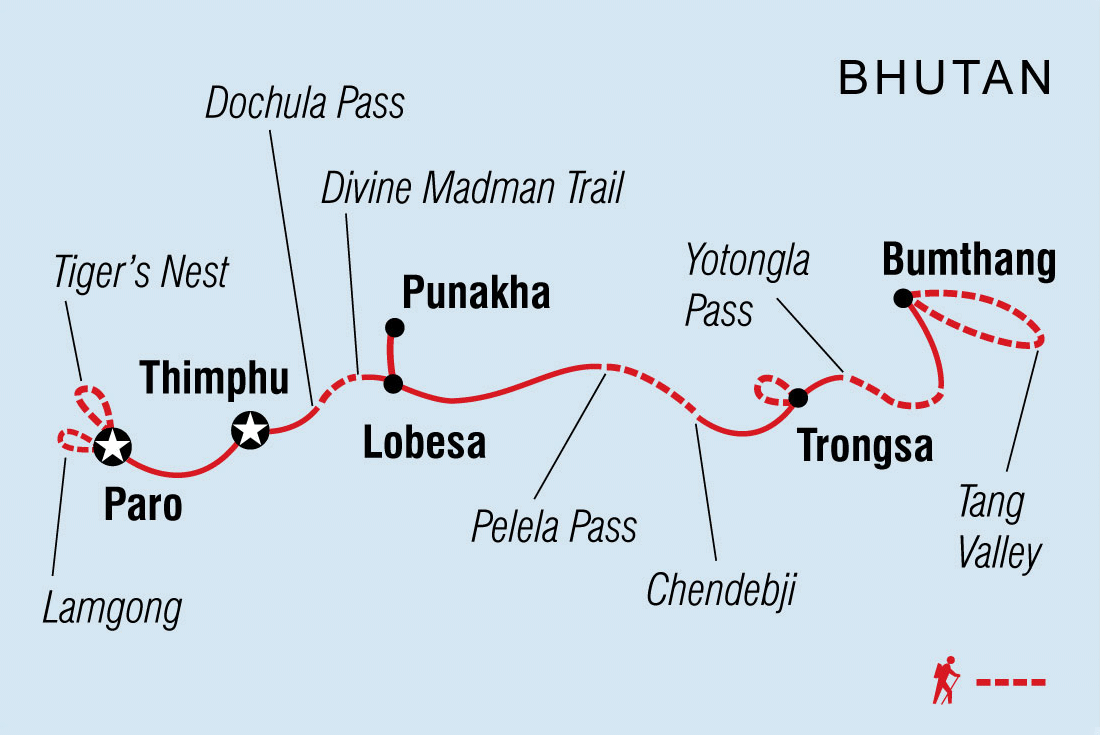


Kuzu Zangpo la! Welcome to Bhutan. When you arrive at Paro International Airport, you’ll be met by your local leader at the arrival gate and transferred to Thimphu – Bhutan’s Capital city. Along the way, stop at the Tachogang Lhakhang Temple, founded by Thankthong Gyelpo – a man who’s revered in Tibetan and Bhutanese culture. After the temple, continue to Thimphu and check into your hotel, where you’ll have time to freshen up before heading out for an orientation walk around Thimphu’s highlights. Tonight, head off with your leader and group for a welcome dinner at a local restaurant and learn about the rich history of Bhutanese cuisine as you tuck into a traditional feast, including seasonal vegetables and the country’s signature dish – red rice with a tasty chili cheese.
After breakfast, embark on the Buddha Point Park Hike, which will start from Debsi towards Buddha Point (Kuensel Phodrang) – home to the country’s largest Buddha statue. The Buddha Dordenma is located on a hill in Kuensel Phodrang Nature Park and overlooks the Southern entrance to Thimphu Valley. Enjoy the panoramic view of the Thimphu Valley and the colourful, fluttering prayer flags while heading up the hill. After, continue to Changangkha then have some lunch. This afternoon, you’ll visit the Institute for Zorig Chusum, more commonly known as the Arts & Crafts School or Painting School, where you can watch students learning traditional artistic skills. At the National Library, you’ll see printing blocks for prayer flags and many beautiful archaic texts.
After breakfast, travel along the Dochula Pass, which sits more than 3000 m above sea level and is marked by a large Bhutanese Chorten and more colourful prayer flags. If the weather’s clear, you’ll enjoy panoramic views of the Himalayas as you hike along the scenic trail. This afternoon, visit Druk Wangyal Lhakhang – a temple built in honour of the fourth King Gyalpo Jigme Singye Wangchuk which celebrates the 100th anniversary of the monarchy in Bhutan. Then, travel down to the valley and hike a section known as the Divine Madman Trail. It’s believed that Drukpa Kuenley, also known as the Divine Madman, came here from Tibet to overpower evil spirits. After a stop for lunch in the beautiful village of Lumitsawa, continue walking until Thinleygang Lhakhang Temple before driving to your hotel in Lobesa.
After a leisurely breakfast, drive to Pelela Pass and re-join the Trans Bhutan Trail at the boundary between western and central Bhutan. Along the way, visit the Rukubji Lhakhang Temple and enjoy a hot lunch prepared by the locals. After, transfer to the beautiful village of Chendebji – home to the Chendebji Chorten. If you’ve been to Kathmandu in Nepal, this large white structure might look familiar as it was built to resemble the famous Bouddhanath Stupa. From Chendebji, you’ll continue to Trongsa and visit the Trongsa Dzong, the largest and most impressive Dzong in Bhutan. After you’ve enjoyed the view, check into your hotel where you may like to enjoy a relaxing evening after a full day of exploring.
If your group didn’t have time to visit Trongsa Dzong yesterday, there’s time for a visit this morning before you drive to Yotongla Pass, where you’ll re-join the Trans Bhutan Trail. After hiking over the pass, you’ll descend through green meadows and open forest until you reach the serene Gyaltsa River. After you’ve had a rest, follow this river until you reach Gyaltsa Village where your private transfer to Bumthang will be waiting. Stop for lunch along the trail, then arrive in Bumthang and check into your hotel for the next two nights. You’ll then head out to visit Bumthang Brewery – producers of Bhutan’s celebrated Red Panda Beer. Nearby is Bhutan’s only commercial cheese factory and both the factory and the brewery are legacies of a Swiss-run development project called Swiss Farm, which introduced distinctive European farming and production techniques into the Bumthang area.
After breakfast this morning, head out to explore the secluded Tang Valley. You'll have time to take in the tranquil location, home to sacred shrines, herds of yaks and lush hillsides dotted with grazing sheep. When you arrive in Tang Village, hike across the suspension bridge towards the century-old Ugyensholing Heritage Museum. Then, drive to Pema Choling Nunnery, where women and girls follow a nine-year course in the Nyingma Peling Buddhist tradition and are known for a particular drum ceremony known as ‘chod’. You’ll then head south along the Trans Bhutan Trail towards the sacred Mebar Tsho (Burning Lake), where, in the 15th century, the great treasure hunter Pema Lingpa is said to have discovered several of Guru Rinpoche’s hidden treasures. You might like to meditate among the calm surroundings before you continue the hike through the forest and reach the small village of Phomrong, where your vehicle will be waiting for you.
Today, head back to Punakha via Trongsa to walk along one of the most iconic sections of the Trans Bhutan Trail and recreate what it was like for those arriving in the city of Trongsa many years ago (on foot). You’ll descend to the Mangde River, then cross the old cantilever bridge, heading for the steep climb through the forest to the Trongsa Viewpoint. Rest here a while to soak up the views, then you can sit back and relax on the drive to Punakha, where you’ll spend the night.
After breakfast, drive to Dochulla Pass, where you’ll start your hike to Simtokha. Throughout the hike, you’ll be treated to a scenic path that runs alongside small villages and meandering streams, giving you a glimpse into Bhutanese life and culture. Prepare yourself for one of the longest hours hikes of this trip! After reaching Simtokha, you’ll drive to Paro. Check-in to the hotel and relax for the rest of the evening.
After breakfast, drive up to Tsendona where you’ll re-join the Trans Bhutan Trail for a short hike. Walk through the thin pine forests to the upper reaches of Dopshari and enjoy the spectacular views over the Paro Valley. Take time to enjoy the scenery before reaching the traditional village of Dopshari. Enjoy a delicious hot lunch in the village where you might have the opportunity to try Ema Datshi (a traditional Bhutanese dish made with chili peppers, onions and yak cheese). After, visit Ta Dzong, which was originally built as a watchtower but now houses a National Museum. Join your leader for a tour of the extensive collection of antique thangkha paintings, textiles, weapons, armour, household objects and historic artifacts. Then, stroll around the local market of Paro before driving back to the hotel in the late afternoon.
After breakfast, lace up your hiking boots and set off on a long hike to the Taktshang Monastery – one of Bhutan’s most famous monasteries. Sitting on the side of a cliff 900 m above the Paro Valley floor, it’s also known as the ‘Tiger’s Nest’. This site is considered to be a deeply sacred place and is visited by all Bhutanese at least once in their lifetime. On 19 April 1998, a fire severely damaged the main structure of the building but now has been restored to its original splendour. Along the way, you’ll also visit the 7th century Kyichu Lhakhang – one of 108 temples built in the Himalayas by the Tibetan King, Songtsen Gampo. This is one of the country’s most famous temples as it marks the introduction of Buddhism to Bhutan. After you’ve returned to your hotel and had time to freshen up, join your leader for a stroll around the streets and market area of Paro.
After a leisurely breakfast at your hotel, your adventure will come to an end and your driver will transfer you to Paro International Airport for your flight out of Bhutan.

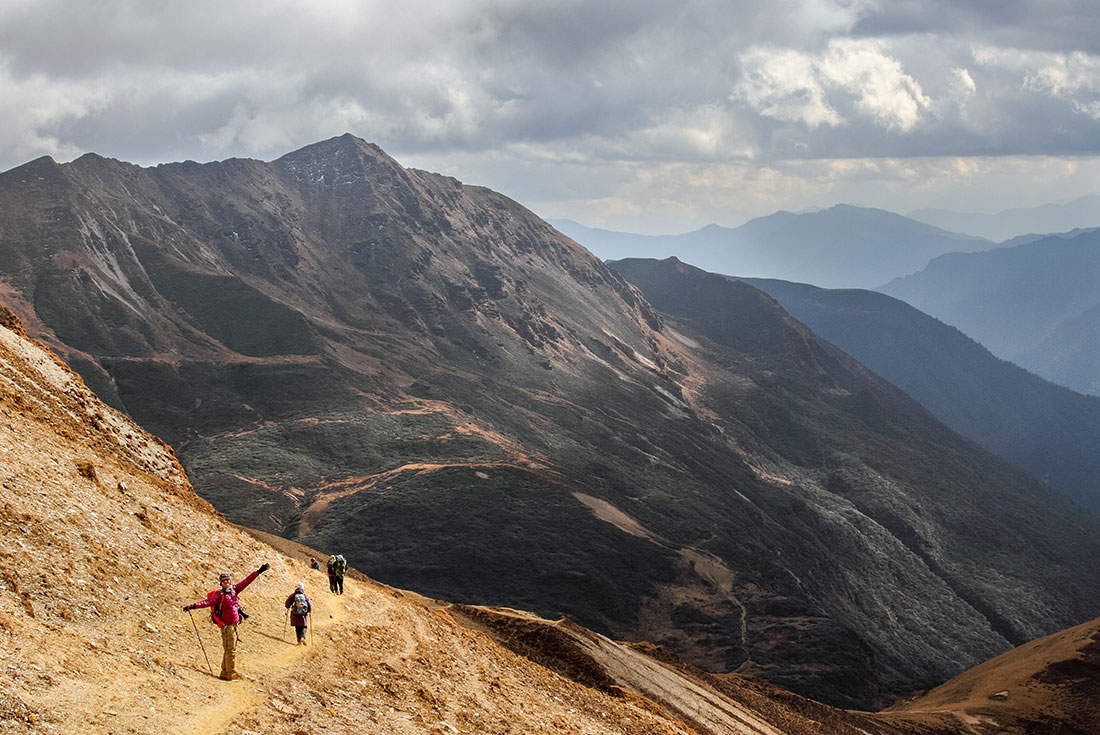
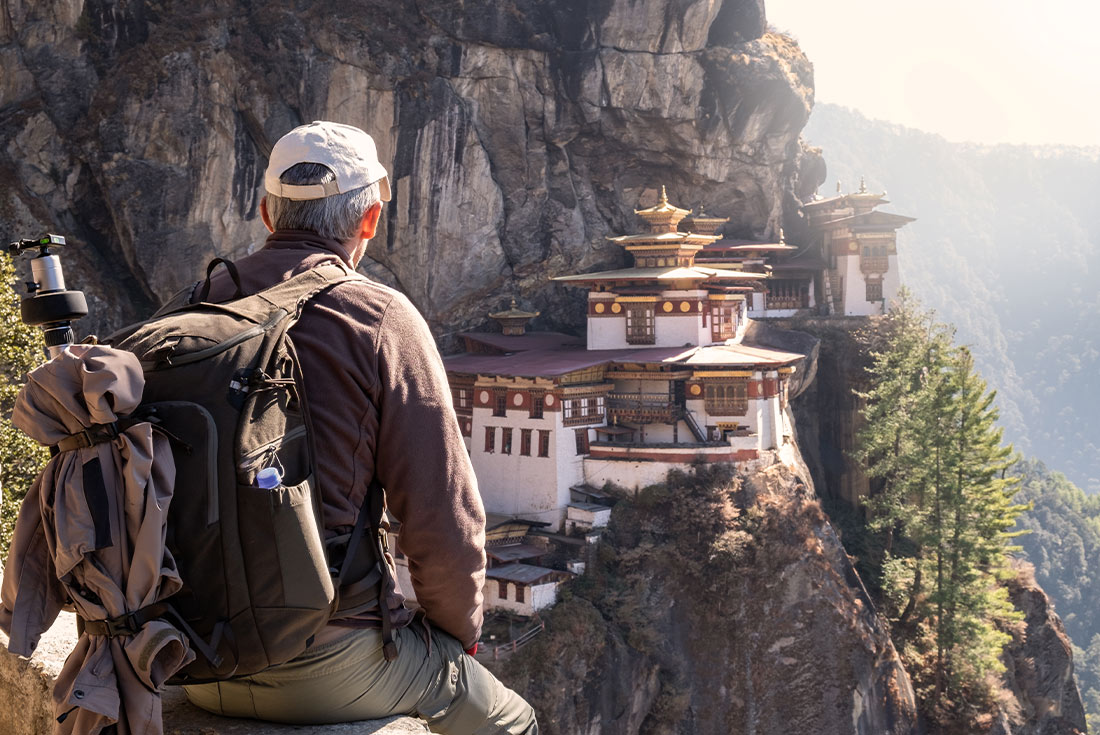
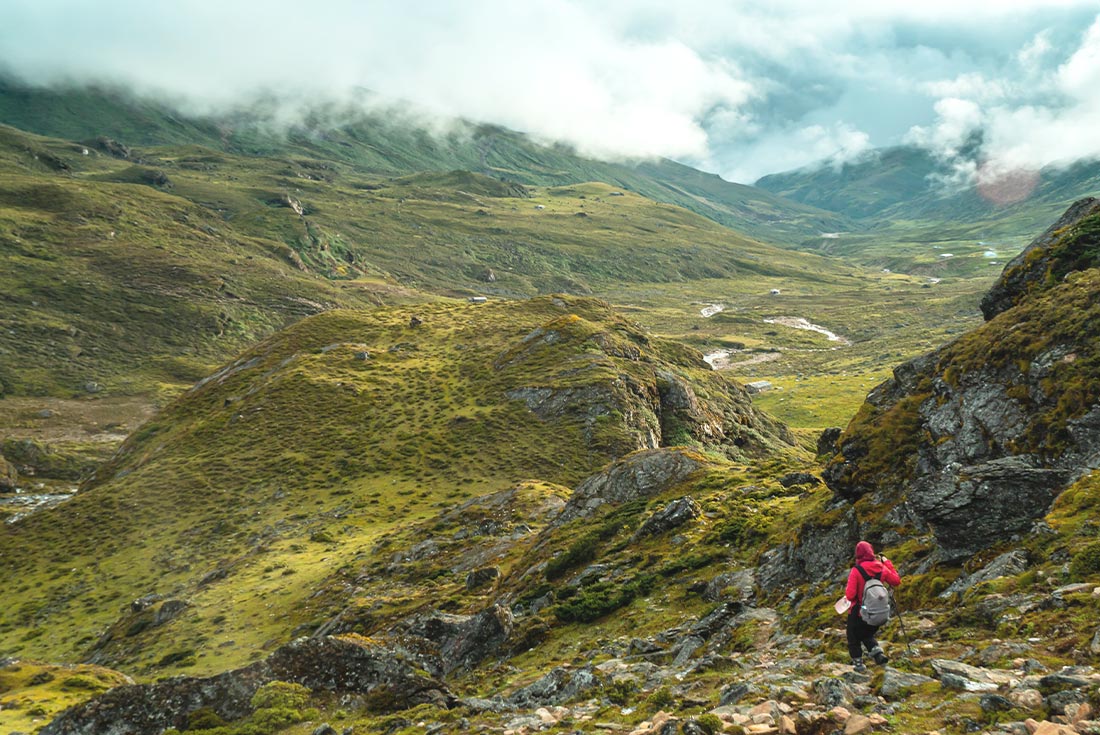
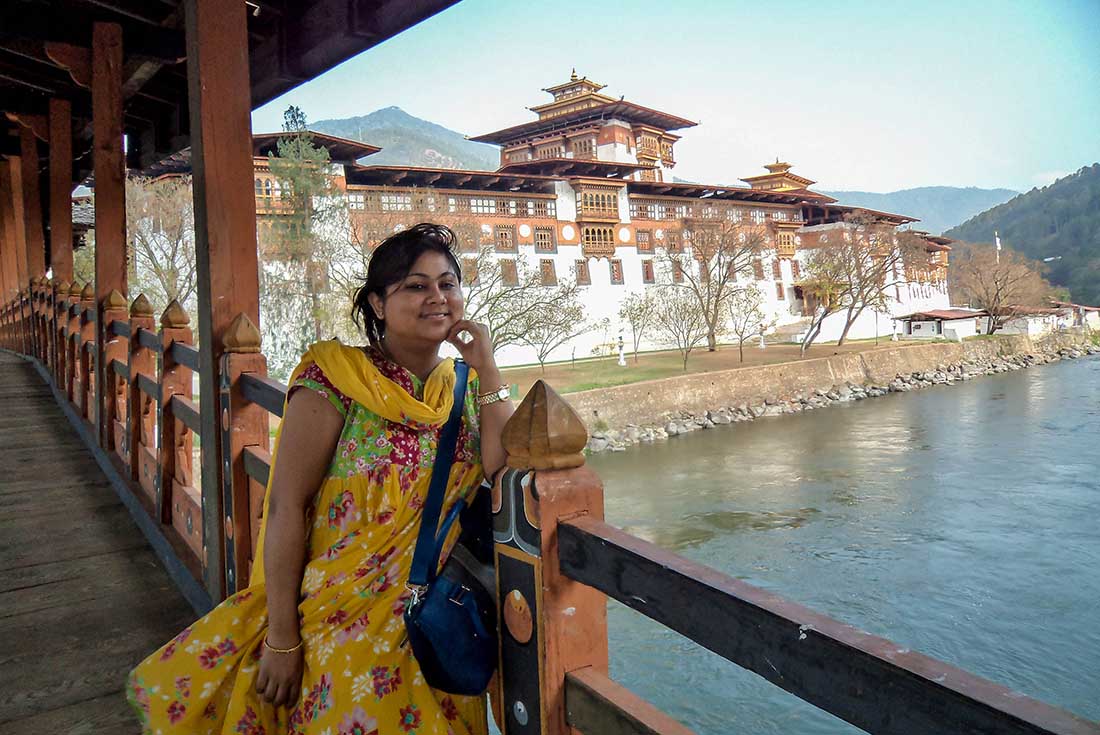
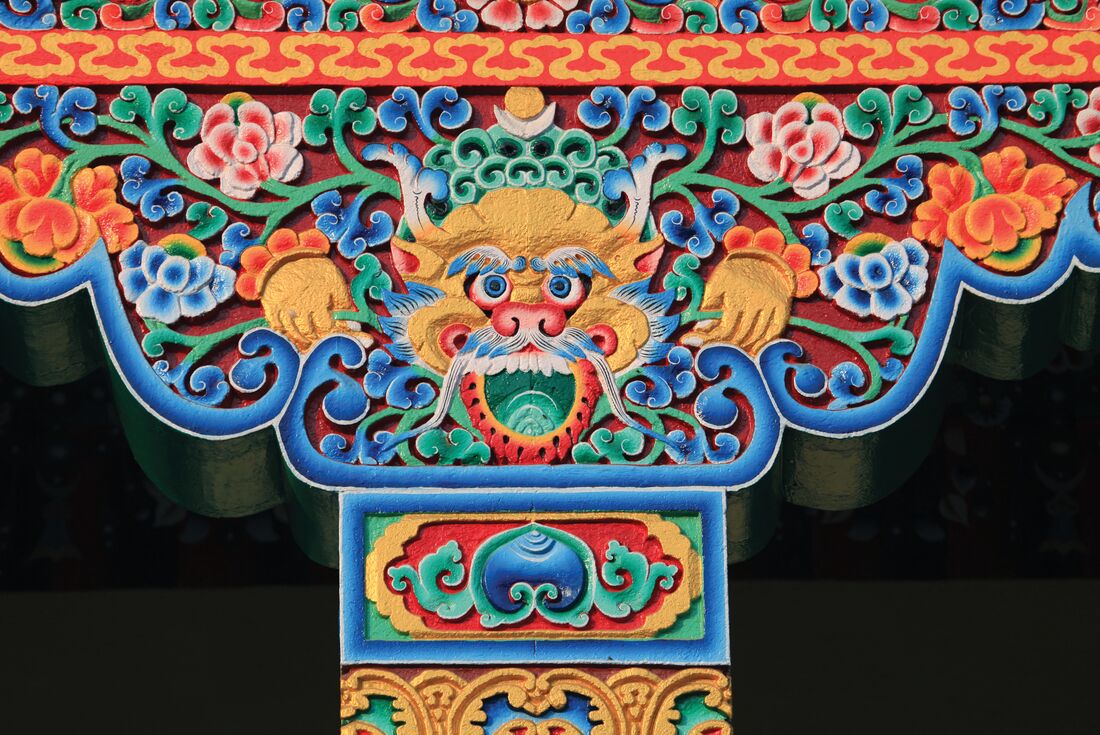
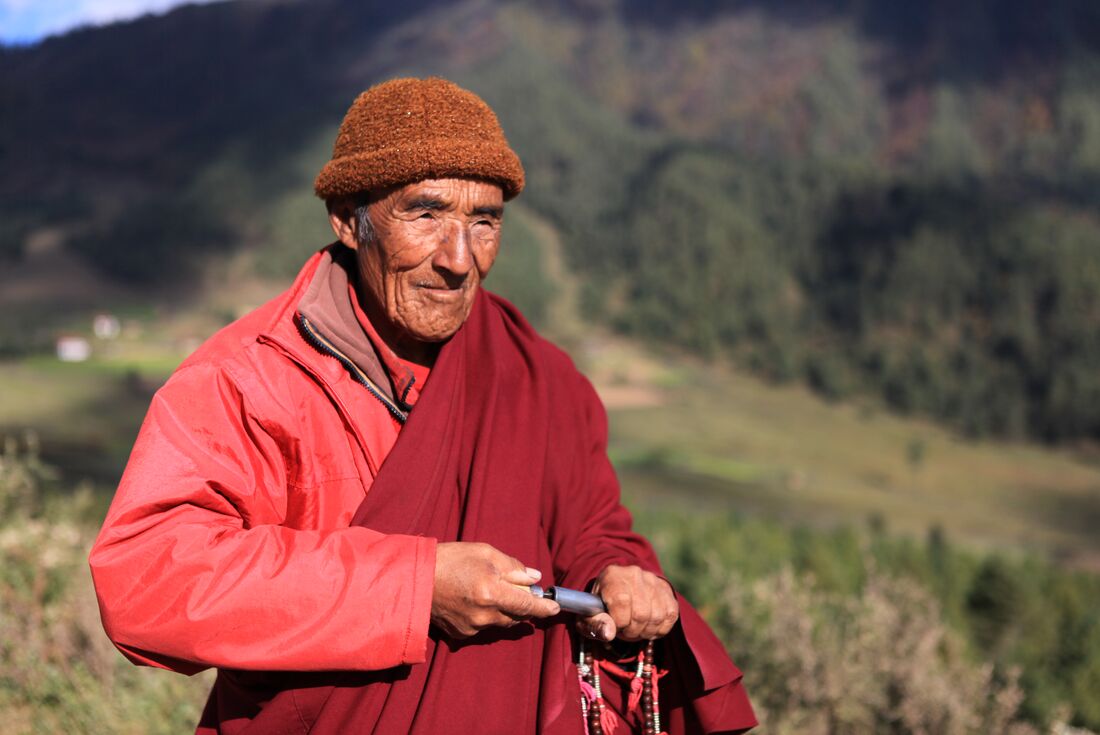
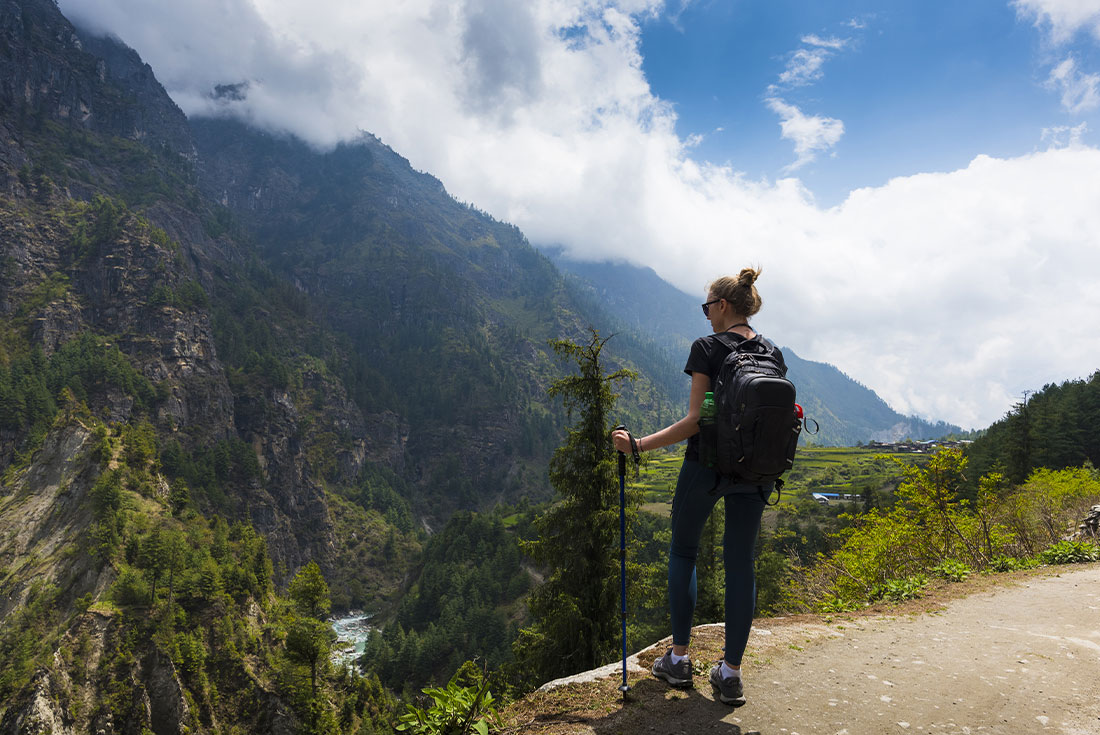
Tachogang Lhakhang temple visit
Thimphu exploratory evening walk
Thimphu - Institute for Zorig Chusum
Thimphu - National Library
Buddha Point (Kuensel Phodrang) walk
Dochula Pass hike
Druk Wangyal Lhakhang temple visit
Divine Madman Trail hike
Trans Bhutan trail hike - Pelela pass/Chendebji
Chendebji Chorten monument visit
Trongsa Dzong (Buddhist school) visit
Trans Bhutan Trail hike - Yotongla Pass/Gyaltsa village
Tang Valley walk
Ugyencholing Heritage Museum visit
Tang Valley - Farmhouse lunch
Hike: Nunnery - Mebar Tsho (Burning Lake) – Phomrong village
Pema Choling Nunnery
Trans Bhutan Trail hike - Trongsa Dzong/Mangde River/Trongsa Viewpoint
Dochula Pass to Simtokha Hike
Trans Bhutan Trail hike - Paro Valley/Dop-Shari
Ema Datshi - traditional Bhutanese lunch
Paro - Tadzong Museum
Paro - Taktsang (Tiger's Nest) Monastery hike
Take in panoramic views of the Himalayas from the Dochula Pass, which sits more than 3000 m above sea level and is home to many fluttering prayer flags.
Hike along the Divine Madman Trail, believed to be a trail followed by Drukpa Kuenley – a famous Buddhist monk, missionary and poet who came to Bhutan from Tibet.
Explore the country’s biggest Dzong (a complex of fortified buildings which served as a Buddhist school) in Trongsa at the end of your hike from Chendebji.
Wander around the remote, lush and beautiful Tang Valley and Mebar Tsho (Burning Lake), famous for being one of the most serene places in Bhutan to meditate.
Journey to Taktsang, commonly known as the Tiger's Nest – a small monastery clinging to a rocky cliff 900 m above the valley floor – and soak in its magnificence.
Hotel Thimphu Central, Chubachu,Below NPPF office,Thimphu , Thimphu, BHUTAN
Bhutan Mandala Resort, Wangchang, Paro Bhutan , Paro, BHUTAN, Phone: +91 84477 47674
1. Complimentary airport arrival and departure transfers are included. You must provide your flight details to your booking agent at least 14 days prior to travel.
2. A single supplement is available if you’d prefer not to share a room on this trip. The single supplement applies to all nights of your trip and is subject to availability. Please speak to your booking agent for further information.
3. Entry to Bhutan is very strict and travellers can only enter Bhutan on a group visa as part of a tour. All travellers must arrive on Day 1 and depart on Day 11 to be eligible for a group visa. At time of booking, please provide your booking agent with a scanned colour copy of your passport, a scanned colour passport photo.
4. The Sustainable Development Fee, charged by the government of Bhutan, is included in your trip price.
5. Please provide your full name exactly as per passport at the time of booking (including any middle names listed on your passport). Fees may apply for adding or amending details within 60 days of departure, and in some cases you will be required to cover the cost of issuing new tickets.
6. All flights to and from Bhutan are operated by a Bhutanese national carrier which fly direct to several cities within Asia/Middle East. It is not uncommon for these airlines to make last minute changes to their flight timetables or be subject to delays. Therefore, it is recommended that you allow plenty of transit time both before your connecting flight to Bhutan, and after your flight from Bhutan ahead of your onward flight connection.
7. If you have booked additional accommodation and transfers in Kathmandu, please see the ‘Passports, visas and entry requirements’ section of the Essential Trip Information for details regarding visas and arrival in Nepal.
8. Due to the nature of outdoor travel, please be aware that this trip will operate on an amended itinerary in high risk weather conditions.
While we always endeavour to provide the best possible holiday experience, due to the nature of travel and the areas we visit sometimes things can and do go wrong. Should any issue occur while you are on your trip, it is imperative that you discuss this with your group leader or local representative straight away so that they can do their best to rectify the problem and save any potential negative impact on the rest of your trip.
We recognise that there may be times when your group leader or local representative may not be able to resolve a situation to your satisfaction - if this is the case, please ask the group leader or local representative to speak to their direct manager.
You may also choose to provide details in your online feedback, which we ask you to complete within 30 days of the end of your trip. Please do be aware that it is very difficult for us to provide any practical help after the trip is completed, so informing us while still travelling will give us the opportunity to resolve the issue in real-time., For general contact details please use the following page: https://www.intrepidtravel.com/contact-us, In case of a genuine crisis or emergency, you can reach our local office on the numbers below:
, Available for phone call or WhatsApp call on +977 980 112 3617
Bhutan is a high-altitude destination, so taking it easy for a day or two makes for a much more comfortable trip. Drinking tea and water and avoiding strenuous exercise will help you acclimatise after arriving., Hiking on this trip can be strenuous and will take place on high altitude, up to 3500 metres above sea level. Please make sure you are adequately prepared physically., Please read packing list available on Essential Trip document carefully and make sure you bring all necessary items., Despite Bhutan being a small country, you'll experience long travel days as most roads are single lane. It’s all part of the adventure and a great way to get to know your fellow travellers. Please read the itinerary carefully for travel time estimates., While it’s legal to consume imported meat, the slaughtering of animals for consumption within Bhutan is banned, therefore delicious veggie dishes are varied and bountiful at every meal., Please be aware that hot water is limited in some places. Speaking of all things heated, the Bhutanese love chilli and the food can be a touch spicy., All meals are included due to the nature of travelling in Bhutan. This means there may be limited choices on some days.
Take in panoramic views of the Himalayas from the Dochula Pass, which sits more than 3000 m above sea level and is home to many fluttering prayer flags., Hike along the Divine Madman Trail, believed to be a trail followed by Drukpa Kuenley – a famous Buddhist monk, missionary and poet who came to Bhutan from Tibet., Explore the country’s biggest Dzong (a complex of fortified buildings which served as a Buddhist school) in Trongsa at the end of your hike from Chendebji., Wander around the remote, lush and beautiful Tang Valley and Mebar Tsho (Burning Lake), famous for being one of the most serene places in Bhutan to meditate., Journey to Taktsang, commonly known as the Tiger's Nest – a small monastery clinging to a rocky cliff 900 m above the valley floor – and soak in its magnificence.
All group trips are accompanied by one of our group leader or local representative. The aim of the group leader or local representative is to take the hassle out of your travels and to help you have the best trip possible. Intrepid endeavours to provide the services of an experienced group leader or local representative however, due to the seasonality of travel, rare situations may arise where your group leader or local representative is new to a particular region or training other group leader or local representative.
Your group leader or local representative will provide information on the places you are travelling through, offer suggestions for things to do and see, recommend great local eating venues and introduce you to our local friends. While not being guides in the traditional sense, you can expect them to have a broad general knowledge of the places visited on the trip, including historical, cultural, religious, and social aspects. At Intrepid we aim to support local guides who have specialised knowledge of the regions we visit. If you are interested in delving deeper into the local culture at a specific site or location then your group leader or local representative can recommend a local guide service in most of the main destinations of your trip.
TRAVEL ADVISORIES & ALERTS
We recommend that you check your government's foreign travel advisory for the latest information about the destination before you travel. You will also need to ensure that your travel insurance covers you for all destinations and activities on your trip. We also recommend saving the phone number for emergency consular assistance for your government’s consulate in the destination/s you’ll be travelling. Links to travel advisories and any current travel alerts for our trips can be found here: https://www.intrepidtravel.com/travel-alerts
PERSONAL SAFETY
Ensure you have a secure method of carrying your passport, phone, credit cards and cash while travelling such as a money belt. Leave all other high value items, including jewellery, at home Use safety deposit boxes at hotels to store your valuables when available and ensure your luggage is lockable. Be aware of the risk of pick-pocketing and petty theft. Exercise caution when walking at night, don’t walk alone and stick to well-lit streets wherever possible. Be vigilant on public transport and look out for your fellow travellers. Take precautions such as carrying your bag in front of you and never leaving personal items unattended.
LGBTQIA+ TRAVELLERS
Intrepid welcomes all LGBTQIA+ customers on our trips, however we operate in parts of the world that are less accepting. We support LGBTQIA+ customers to travel to these destinations and are committed to ensuring they face no discrimination on any part of the trip we control. We recommend you visit Equaldex (https://www.equaldex.com/) and your government's foreign travel advice for LGBTQIA+ travellers when choosing your trip., https://www.intrepidtravel.com/safety-guidelines, PETTY CRIME:
The crime rate in Bhutan is low, but there are occasional thefts and petty crime, such as pick-pocketing and purse snatching in areas frequented by tourists.
PASSPORT
You’ll need a valid passport to travel internationally and most countries require your passport to have a minimum of 6 months validity, so remember to check the expiry date.
We need your passport information to get everything ready for your trip so it’s important that the information on your booking matches your passport exactly. Please take care to provide the correct details. We recommend carrying a copy of the photo page of your passport while travelling and leaving a copy at home with family or friends.
VISAS & ENTRY REQUIREMENTS
Many countries require a visa and obtaining the correct visa for your trip and any countries you may transit through is your responsibility. We recommend you check your visa requirements as soon as you have booked your trip. This will ensure you have time to prepare your documents and for your visa application to be processed. You can check the entry requirements for your nationality on your government's foreign travel advisories, consular websites or on our page here: www.intrepidtravel.com/visa-entry-requirements, BHUTAN
All nationalities require a visa for Bhutan. Travellers can only enter Bhutan on a group visa as part of a tour. Independent visas are not issued. The cost of the visa is included in your tour.
The following details are required at time of booking in order for us to apply for your group’s visa:
- A clear uncut scanned colour copy of the two pages of the personal details section of your passport
- Passports must have 6 months validity from the time of travel
- A scanned colour passport photo with no border. Portrait style with eyes open and forehead & ears clearly visible. Must be taken with a white background.
- Email address you will access while travelling
- Arrival and departure flight details
Due to the controlled nature of travel in Bhutan the group visa application can only be submitted once we have the above details from ALL travellers in your group. Failure to advise any of the information above can slow the visa issuing process, and delay the visa for the whole group.
The group visa will be issued between 5 days and 48 hours from departure. We will send your visa to your travelling email address. Please print this visa as you must show it at check-in for your flight to Bhutan and on arrival at immigration in Bhutan, where you will have an entry stamp placed in your passport.
TRAVELING THROUGH INDIA
If you are traveling through India, you may need a visa, even if you are not staying in the country. Please refer to your government's foreign travel advice for most up to date information. This is especially important for those that are planning on entering India multiple times in a two month period. Foreigners holding an Indian Tourist Visa, who after initial entry into India plan to visit neighbouring Nepal, Bhutan or Sri Lanka and then re-enter into India within 2 months need to get special authorisation., ADDITIONAL ARRANGEMENTS IN KATHMANDU
If you are flying in and out of Bhutan from Kathmandu, we are able to book accommodation and transfers in Kathmandu. Please speak to your booking agent about this.
You will require a visa to enter Nepal.
This can be obtained on arrival at Kathmandu’s international airport. You will need two passport photos and the following fees in USD (subject to change, cash only).
- multi entry visa valid for 15 days - US$30
- multi entry visa valid for 30 days - US$50
- multi entry visa valid for 90 days - US$125
If you have booked an arrival transfer, you must provide your flight details into Kathmandu no later than 14 days prior to arrival.
For your confirmed arrival transfer, you’ll be met after exiting customs by a transfer representative holding an Intrepid sign. They generally stand on the lefthand side.
In case of flight cancellations, changes, if you experience severe delays at immigration, baggage collection or customs, or if you are not able to find the driver, please contact the transfer operator directly: +977 9801020375.
Information not available.
Validity: 01 Jan 2026 to 31 Dec 2026
GENERAL HEALTH
All travellers need to be in good physical health in order to participate fully on this trip. For the safety and wellbeing of yourself and others, if you are unwell prior to travelling, please stay at home and contact us to make alternative arrangements.
When selecting your trip please make sure you have read through the itinerary carefully and assess your ability to manage and enjoy our style of travel. Please note that if in the assessment of our group leader or local representative a traveller is unable to complete the itinerary without undue risk to themselves and/or the rest of the group, we reserve the right to exclude them from all or part of a trip without refund.
You should consult your doctor for up-to-date medical travel information or for any necessary vaccinations before departure. We recommend that you carry a first aid kit as well as any personal medical requirements in their original packaging as they may not easily be obtained while travelling. If you are carrying medication, ensure you check your government's foreign travel advice for any local restrictions or requirements.
, ALTITUDE SICKNESS
Much of Bhutan is at elevations of over 2,500m and travellers can be affected by altitude sickness. Altitude sickness can be life threatening and can affect anyone, even the physically fit. Those more at risk include people who have had altitude sickness before, who exercise or drink alcohol before adjusting to the altitude, or who have health problems that affect breathing. See your doctor prior to travelling to Bhutan to get advice specific to you and your situation. Monitor your health and well-being during the trip and report immediately to your leader if you feel unwell. Ensure your travel insurance covers you for altitude sickness and medical evacuation.
MOSQUITO-BORNE ILLNESSES
Outbreaks of dengue fever and malaria have been known to occur in Bhutan. Protect yourself against mosquito-borne illnesses by taking measures to avoid insect bites, including using insect repellent and wearing long, loose-fitting, light-coloured clothing.
While travelling with us you'll experience the vast array of wonderful food available in the world. Your group leader or local representative will be able to suggest restaurants to try during your trip. To give you the maximum flexibility in deciding where, what and with whom to eat, generally not all meals are included in the trip price. This also gives you more budgeting flexibility. As a rule, our groups tend to eat together to enable you to taste a larger variety of dishes and enjoy each other's company. If you have dietary requirements and/or food allergies, please let your booking agent know prior to departure., BHUTAN FOOD:
All meals are included with the cost of your trip to Bhutan. Generally, meals will be buffet style and taken in your hotel or guesthouse. Lunches and dinners normally include a selection of western, Chinese, or Indian style dishes, with some local specialties on occasion. Don't forget to try emma datse (chili and cheese) and red rice. Rice and vegetable dishes are always present for every meal. Vegetarians are well catered for and meat is the exception rather than the rule with most meals. Bottled and alcoholic drinks are not included with meals and are paid for separately.
Restaurants will cook three or four dishes per group to share. Choices are limited and feedback has suggested that the food isn't the main reason to visit Bhutan. Meals may become a little monotonous with similar offerings at most restaurants.
Please don't be offended that your leader and driver do not eat with you. This is the custom in Bhutan and leaders and drivers generally eat together in another section of the restaurant.
SPENDING MONEY
When it comes to spending money on the trip, every traveller is a little different. You know your spending habits better than we do, so please budget an appropriate amount for things like optional meals, drinks, shopping, optional activities, and laundry. Make sure you have read the itinerary and inclusions thoroughly so you know what is included in the trip price and what you may need to pay for while travelling. , BHUTAN
The official currency of Bhutan is the Bhutanese Ngultrum (BTN). The Indian Rupee is also accepted as legal tender in Bhutan, but Indian currency in large denominations may not be accepted. ATMs are available only in Thimphu and Paro. Credit cards are accepted only in larger tourist shops for large purchases.
We recommend bringing cash to exchange. All major currencies are accepted and can be exchanged at the airport on arrival. Ensure you have new, clean and undamaged notes. The exchange rate varies depending on the denomination of the notes you’re exchanging. Higher denominations get you a better exchange rate.
BTN is a blocked currency, which means it can only be obtained in Bhutan and cannot be exchanged outside Bhutan. Ensure you use or exchange all BTN before leaving the country.
All meals are included on your Bhutan trip. You will only need extra spending money for souvenirs, drinks and tips.
, TIPPING
Tipping can be an appropriate way to recognise great service when travelling. While it may not be customary in your home country, it is an entrenched feature of the tourism industry across many of our destinations and is greatly appreciated by the people who take care of you during your travels. It is always best to avoid tipping with coins, very small denomination notes, or dirty and ripped notes, as this can be regarded as an insult rather than the goodwill gesture it is intended to be., OPTIONAL TIPPING KITTY
On Day 1 of your trip, your group leader or local representative may discuss with you the idea of operating a group tipping kitty, whereby everybody contributes an equal amount and your group leader or local representative distributes tips for drivers, local guides, hotel staff and other services included on your trip. Participation in this kitty is your choice, and you are welcome to manage your own tipping separately if you prefer.
The group leader or local representative will keep a running record of all monies spent, which can be checked at any time. Any funds remaining at the end of the trip will be returned to group members. These tips to suppliers are for great service and are in addition to the regular costs paid for the services supplied.
The tipping kitty excludes tips for your group leader or local representative, and providers of optional activities., Optional tipping kitty for this trip: BTN 1000 per person., YOUR GROUP LEADER OR LOCAL REPRESENTATIVE
Tipping your group leader or local representative is highly appreciated if you feel they’ve provided outstanding services throughout your trip. The amount is entirely a personal preference; however, as a guideline, the recommended amount is 4-7 USD or EUR per traveller per day (in a currency relevant to your destination). Of course, you are free to tip more or less as you see fit, depending on your perception of service quality and the length and involvement of your group leader or local representative on your trip., TIPPING FOR TREKKING IN BHUTAN
You may like to tip the crew who accompany you during your trek. In addition to your leader, you will be accompanied by assistant guides and porters. We recommend USD 3 per traveller per day. Tips will be divided among the crew at the end of the trek.
, CONTINGENCY FUNDS
We try to plan for every eventuality, but there are still some things beyond our control. We reserve the right to change an itinerary after departure due to local circumstances or a Force Majeure Event. In such emergency circumstances, the additional cost of any necessary itinerary alterations will be covered by you. Please note we are not responsible for any incidental expenses that may be incurred as a result of the change of itineraries including but not limited to visas, vaccinations or non-refundable flights. Make sure you have access to an extra US$500 for emergencies (e.g. severe weather, natural disasters, civil unrest) or other events that result in unavoidable changes to the itinerary (e.g. transport strikes or cancellations, airport closures). Sometimes these things necessitate last-minute changes to enable our trips to continue to run, and as a result, there may be some extra costs involved. The recommended amount is listed in USD for the relatability of universal travellers, however, local currency may be needed once in the country to cover these costs.
LUGGAGE
Alongside your main piece of luggage, we recommend bringing a small to medium backpack (25-30 litres) for day walks. A backpack with a waist strap will be the most comfortable option for all included walks.
ESSENTIALS
Lightweight, comfortable and quick-drying clothing is recommended. Laundry facilities may not be available every day.
• Warm layers such as a light jacket, fleece and base layers.
• Breathable, non-cotton t-shirts.
• Long hiking pants or zip-offs.
• Nylon hiking shorts.
• Quality hiking socks.
• Wind and waterproof outer layers (jacket and trousers).
• Gloves and mitts - waterproof and warm (winter months).
Hiking boots with a good grip, ankle support and waterproof membrane that are comfortable to wear for an entire day.
Walking poles for support on steep uphill sections and longer descents.
Comfortable shoes or sandals for shorter walks or time spent not hiking.
A water bottle that holds 1 – 2 litres.
Sun protection – sunscreen, sunglasses, hat, bandana.
Torch, flashlight or headtorch.
ADDITIONAL RECOMMENDATIONS
For general packing considerations, check out our ultimate packing list: https://www.intrepidtravel.com/packing-list
WEATHER IN BHUTAN
Bhutan can be divided into three areas. In the south, you’ll find the lowlands fronting the Indian border, which enjoy a subtropical climate. This region sees monsoonal rains from June to mid-October and mild winters through December, January and February.
Travel north and the climate becomes progressively colder as the Himalaya rise. The central belt of the country, in the lower foothills of the Himalaya, features cold, dry winters and warm summers with monsoonal rains on the southern sides, while the valleys experience less rainfall thanks to the mountains’ protection.
In the northern regions, as the Himalaya rise above 2500 metres (8202 feet), the winters are cold and while the summer can be warm, the valleys are generally protected against monsoonal rain.
Intrepid won't tolerate any kind of violence, harassment (whether physical, verbal or sexual), or disrespect toward fellow travellers, our teams or local communities.
To ensure the wellbeing of everyone on the trip, decisions made by your group leader are final.
Romantic relationships between travellers and group leader or local representative are not permitted while on trip.
Any behaviour that prevents your leader from continuing the itinerary as planned, breaks local laws or opposes any of these guidelines may result in Intrepid denying your booking or removing you from the trip.
If something concerns you during your travels, please speak to your group leader immediately. Alternatively, you can contact us on the emergency contact number detailed in the Problems and Emergency Contact Information section of this Essential Trip Information.
The style of accommodation indicated in the day-to-day itinerary is a guideline only and may change. On some occasions, alternative arrangements may need to be made due to the lack of availability of rooms in our preferred accommodation. In these cases, we will use a similar standard of accommodation.
Throughout the trip, we request that our properties prepare rooms in time for our arrival, especially if we're arriving prior to normal check-in time. However, this isn't always possible which means we won't be able to check-in immediately on arrival at some hotels. Instead, we can store our luggage and explore our new destination or on some trips, have use of shared day rooms until all rooms are available.
BHUTAN:
Whilst there are approx 8000km of roads in Bhutan, the quality varies greatly depending on proximity to the major towns of Thimpu and Paro. As such, even short distances can take longer than expected. Bhutan is currently upgrading a lot of its road network and delays are common. Roads are narrow and speeds are slow. Landslides are common, particularly after rain and occasionally trips are diverted due to debris blocking roads. Thimpu is also famous as the worlds only capital city without a traffic light.
Travel insurance is compulsory on all our trips for those travelling internationally. We require that, at a minimum, you are covered for medical expenses, including emergency repatriation. If you are travelling within your home country or region, please confirm before travel that you are entitled to access the public medical system easily should an accident occur. We strongly recommend all travellers have a policy that also covers personal liability, cancellation, curtailment and loss of luggage or personal effects. For international trips, you will not be permitted to join the group until evidence of travel insurance and the insurance company's 24-hour emergency contact number has been sighted by your group leader or local representative.
If you have credit card insurance, your group leader or local representative will require details of the participating insurer/underwriter, the level of coverage, policy number, and emergency contact number, rather than the bank's name and your credit card details. Please contact your bank for these details prior to arriving in-country.
For travellers who reside within the European Union, Switzerland or the USA, the requirement to purchase travel insurance cannot be compulsory. However, the purchase of travel insurance is still highly recommended, and each country you visit may have its own specific entry requirements. For example, some mandate travel health insurance for all foreign travellers, regardless of their nationality. Travellers from the European Union, Switzerland or the USA who decline travel insurance when travelling outside their home region must sign a Travel Insurance Waiver Form at the Group Meeting, recognizing personal responsibility for emergency medical and repatriation costs should they arise.
For assistance with travel insurance or other services, please visit the link below:
, https://www.intrepidtravel.com/booking-resources/our-services
As you travel on a group trip you will be exposed to all the pleasures and maybe some of the frustrations of travelling in a group. Your fellow travellers will probably come from all corners of the world and likely a range of age groups too. We ask you to be understanding of the various needs and preferences of your group - patience with your fellow travellers is sometimes required for the benefit of everyone's travel experience. Remember too that you have responsibilities to the group. If you are requested to be at a place at a certain time, ensure that you don't keep the rest of the group waiting. We have found time and time again that the very best trips we operate are those where the dynamics within the group work well - this takes just a little effort on your part. Due to privacy reasons, we are unable to provide you with contact details and any personal information about your fellow travellers booked on your trip prior to departure., SOLO TRAVELLERS
On our trips, rooming is organised on a twin-share basis. We pair up solo travellers with another traveller of the same gender, as per the gender marker on each of their passports.
We also offer an optional single supplement on most trips for travellers who prefer to have their own room. This only applies to accommodation during the tour. Pre-trip and post-trip accommodation booked through us will always be on a single-room basis.
On a small selection of trips some accommodation will be open-gender and multishare, such as a felucca in Egypt or an overnight train in Vietnam. Please review the Accommodation section of the Essential Trip Information for details about your trip.
LGBTQIA+ TRAVELLERS
We strive to create a safe and inclusive environment for everyone. If your gender identity differs from what is indicated on your passport, please contact us so that we can discuss rooming options with you.
ITINERARY CHANGES
Our itineraries are updated regularly throughout the year based on customer feedback and to reflect the current situation in each destination. The information included in this Essential Trip Information may therefore differ from when you first booked your trip. It's important that you review this information prior to travel so that you have the latest updates. Due to weather, local conditions, transport schedules, public holidays, political unrest or other factors, further changes may be necessary to your itinerary once in-country. Your group leader or local representative will keep you up to date with any such changes once your trip is underway and has the authority to amend or cancel any part of the trip itinerary if deemed necessary due to safety concerns.
, OPTIONAL ACTIVITIES
A selection of optional activities that have been popular with past travellers are listed in the day-to-day itinerary. This isn't an exhaustive list and should be used as a guide only for some of what might be available. Prices are approximate, are for entrance fees only, and don’t include transport to and from the sites or local guides unless indicated. All activities are subject to availability, and maybe on a join-in basis. It may not be possible to do all the activities listed in the time available at each destination, so some pre-planning for what you are most interested in is advised. When it's recommended that travellers pre-book these activities, look for a note in the Special Information section of the day-to-day itinerary. For most, they can either be organised independently on the day, or let your group leader or local representative know you are interested at the Welcome Meeting and they can assist.
Where activities are considered medium or high risk, we work with operators whose safety and credentials we have sighted and assessed. Although it is possible that you may find the same activity cheaper with another operator on the ground, we cannot vouch for the safety or quality of that operator. Medium and high-risk activities not listed above have not been assessed by us and as such our staff and group leader or local representative are unable to assist you with organising these activities. Activities that contravene our Responsible Travel policies are also not listed. Please remember that the decision to partake in any activity not listed is at your own discretion and risk.